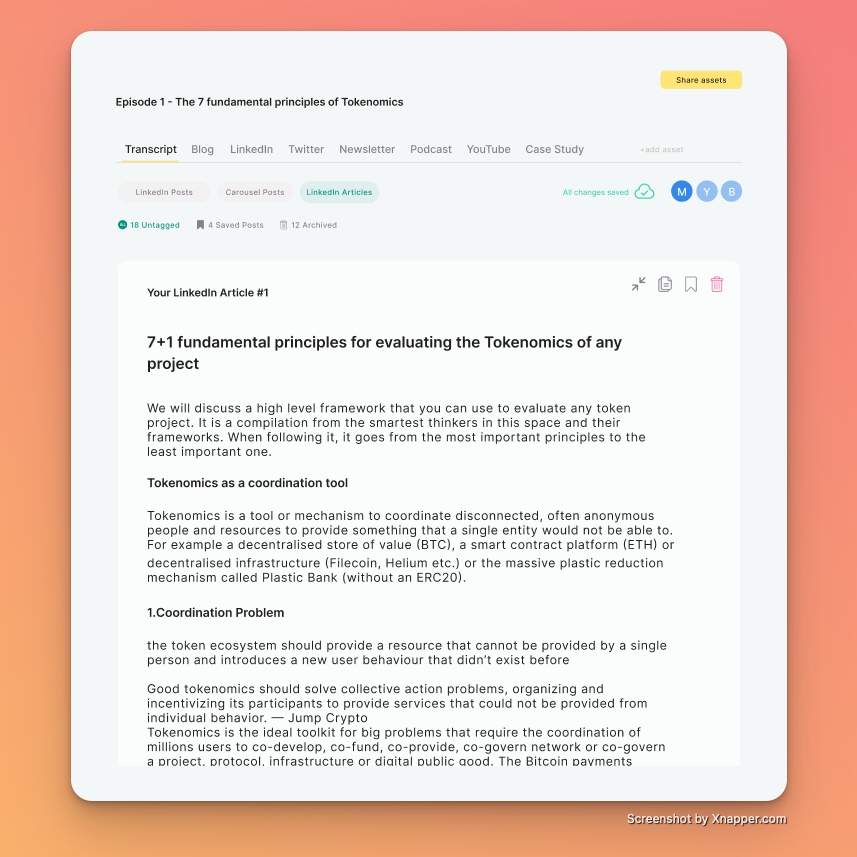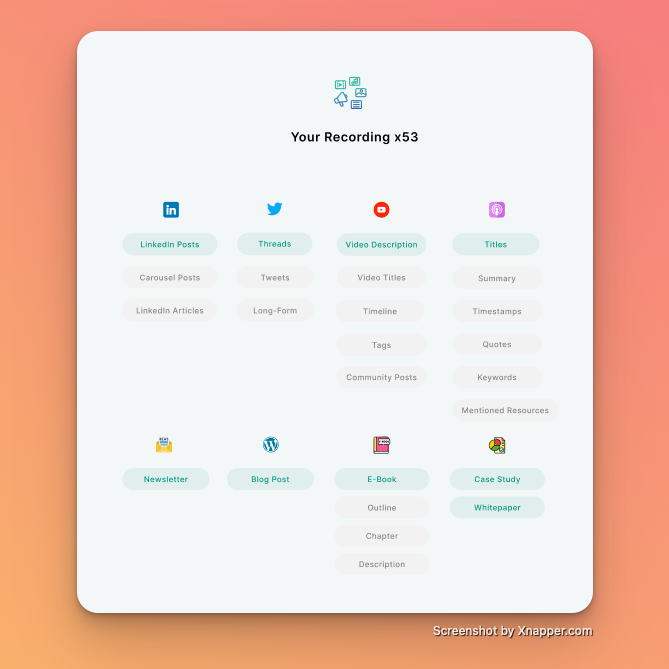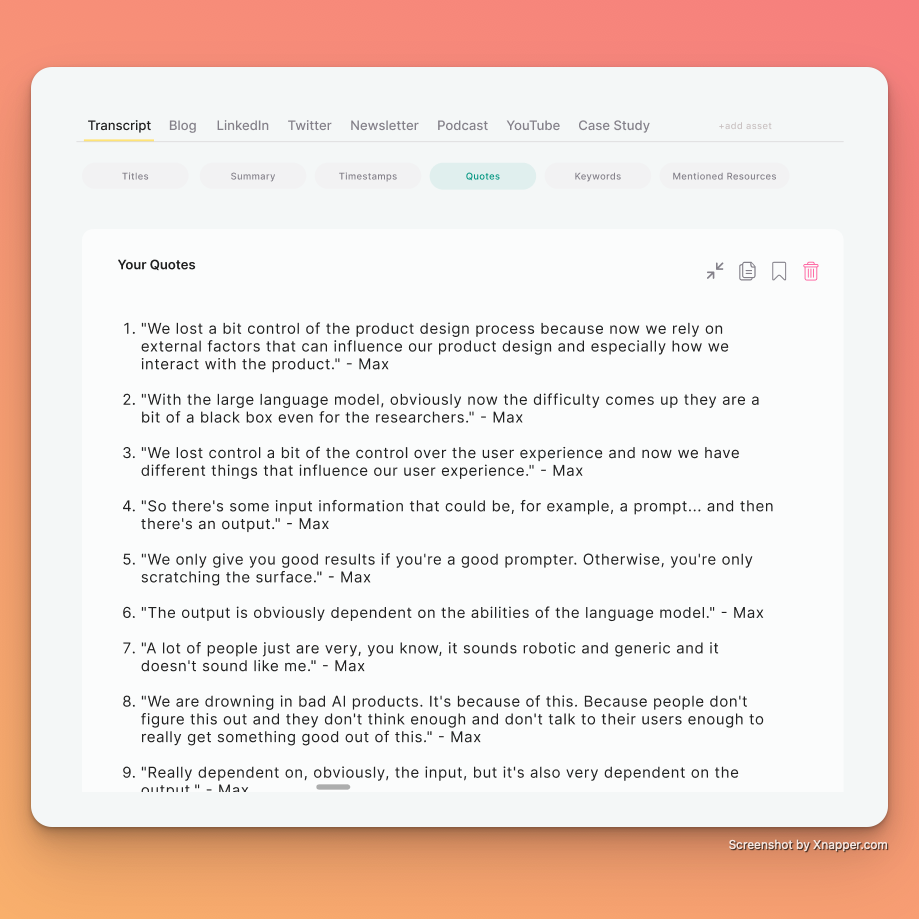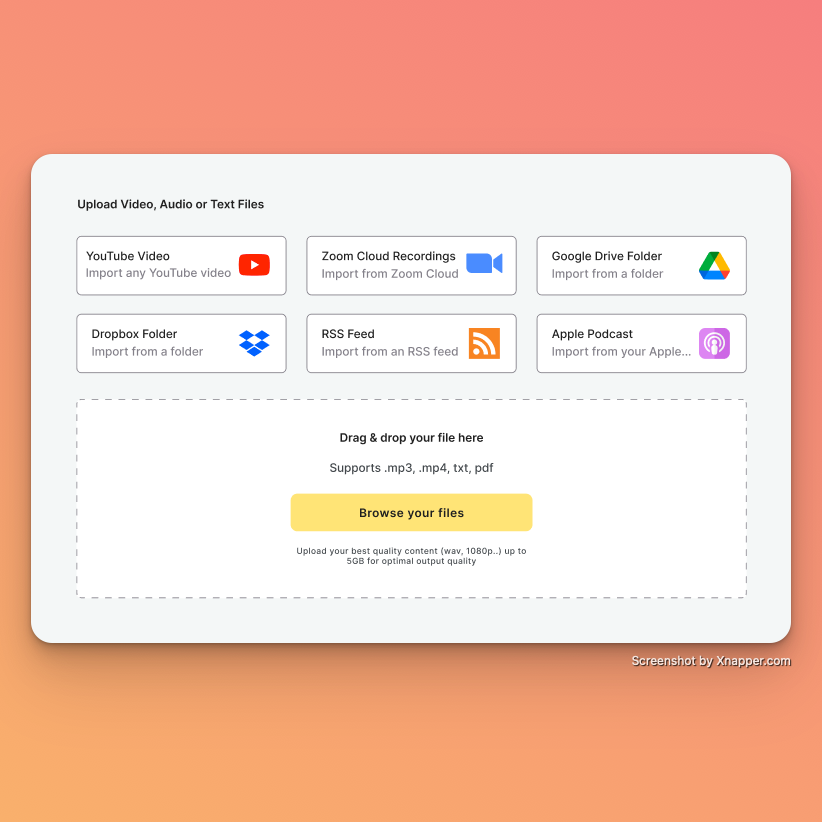Literature Podcast Name Ideas
100 Literature Podcast Name Ideas
Framework 1: Niche-Specific Keywords
Steps:
1. Identify the core subject of your channel (e.g., Literature, Books, Reading).
2. List relevant keywords related to the subject.
3. Combine keywords to create a clear and descriptive name.
Examples:
– Literature + Insights = Literature Insights
– Books + Discussions = Book Discussions
– Reading + Corner = Reading Corner
– Novels + Analysis = Novel Analysis
– Poetry + Hour = Poetry Hour
Framework 2: Unique Value Proposition
Steps:
1. Determine what unique aspect your channel offers (e.g., Deep Analysis, Author Interviews, Book Reviews).
2. Think of words that describe this unique value.
3. Combine these descriptive words with your subject matter.
Examples:
– Deep Analysis + Literature = Deep Literature
– Author Interviews + Books = Author Book Talks
– Book Reviews + Reading = Reading Reviews
– Literary Critique + Novels = Novel Critique
– Storytelling Techniques + Poetry = Poetry Techniques
Framework 3: Audience-Focused Naming
Steps:
1. Identify your target audience (e.g., Avid Readers, Literature Students, Book Lovers).
2. List the goals or challenges of your audience (e.g., Discover New Books, Enhance Literary Knowledge, Author Insights).
3. Combine these elements into a name that speaks directly to your audience.
Examples:
– Avid Readers + Discover New Books = Reader’s Discovery
– Literature Students + Enhance Literary Knowledge = Literary Knowledge Hub
– Book Lovers + Author Insights = Author Insight Pod
– Enthusiastic Readers + Book Discussions = Reader’s Chat
– Literary Enthusiasts + Critical Analysis = Literary Analysis Pod
Framework 4: Creative and Catchy
Steps:
1. Brainstorm fun and catchy words related to your niche.
2. Think about phrases or combinations that are easy to remember.
3. Mix and match words until you find a combination that stands out.
Examples:
– Bookworm + Bliss = Bookworm Bliss
– Page + Turners = Page Turners
– Story + Time = Story Time
– Lit + Lounge = Lit Lounge
– Novel + Nook = Novel Nook
Framework 5: Authority and Expertise
Steps:
1. Identify words that convey authority and expertise (e.g., Masterclass, Expert, Scholar).
2. Combine these words with your subject matter to create a name that suggests professionalism.
3. Ensure the name reflects the credibility of your content.
Examples:
– Literature + Masterclass = Literature Masterclass
– Book + Expert = Book Expert Pod
– Reading + Scholar = Reading Scholar
– Novel + Authority = Novel Authority
– Literary + Guru = Literary Guru
Framework 1: Word Play and Puns
Use clever wordplay, puns, or alliteration to create a fun and memorable channel name. This approach can make your channel name catchy and engaging.
Steps:
1. Identify key themes or subjects of your channel (e.g., Classic Literature, Modern Fiction, Poetry).
2. Brainstorm puns or playful phrases related to these themes.
3. Combine words creatively to make the name fun and memorable.
Examples:
– Classic Literature + Pun = LitLovers Lounge
– Modern Fiction + Pun = Fiction Fix
– Poetry + Pun = Poetic Pulse
– Short Stories + Pun = Story Snippets
– Drama + Pun = DramaRama Reads
Framework 2: Problem-Solution Naming
Focus on the problem your channel solves or the benefit it provides. This approach makes it clear to viewers what they can expect from your channel.
Steps:
1. Identify common problems or challenges your audience faces (e.g., Lack of Reading Time, Understanding Classics, Finding Good Books).
2. Highlight the solution or benefit your channel offers.
3. Combine these elements into a name that addresses the problem and solution.
Examples:
– Lack of Reading Time + Solution = Quick Lit Quench
– Understanding Classics + Solution = Classic Clarity
– Finding Good Books + Solution = Book Scout
– Literary Analysis + Solution = Lit Insight
– Reading Motivation + Solution = Read Revival
Framework 3: Descriptive and Direct
Use straightforward and descriptive words to clearly communicate the channel’s focus. This makes it easy for viewers to understand what your channel is about at a glance.
Steps:
1. Identify the main focus or subject of your channel (e.g., Book Reviews, Author Interviews, Literary History).
2. Use direct and descriptive words related to this focus.
3. Combine these words to create a clear and informative name.
Examples:
– Book Reviews + Description = The Book Review Podcast
– Author Interviews + Description = Author Insights
– Literary History + Description = Lit History Chronicles
– Genre Focus + Description = Speculative Fiction Focus
– Literary Analysis + Description = In-Depth Lit Analysis
Framework 4: Personal Branding
Incorporate your name or a personal brand element into the channel name to create a personal connection with your audience. This can make your channel feel more approachable and unique.
Steps:
1. Decide if you want to use your name, nickname, or a brand element (e.g., Name, Nickname, Brand Element).
2. Think of ways to combine this personal element with your channel’s focus.
3. Create a name that feels personal and relatable.
Examples:
– Name + Focus = Jane’s Book Nook
– Nickname + Focus = Lit with Lizzy
– Brand Element + Focus = Bookish with Ben
– Name + Topic = Emma’s Lit Lounge
– Nickname + Topic = Tom’s Tome Talk
Framework 5: Inspirational and Motivational
Use words that inspire or motivate your audience. This approach can create a positive and uplifting association with your channel.
Steps:
1. Identify the inspirational or motivational themes related to your content (e.g., Empowerment through Reading, Lifelong Learning, Literary Exploration).
2. Choose words that evoke these themes.
3. Combine these words to create an uplifting and inspiring name.
Examples:
– Empowerment through Reading + Word = EmpowerLit
– Lifelong Learning + Word = Learn with Lit
– Literary Exploration + Word = Lit Journeys
– Inspiration from Stories + Word = Story Spark
– Motivation to Read + Word = Read to Lead
Framework 1: Acronyms and Abbreviations
Use acronyms or abbreviations to create a concise and memorable channel name. This can make the name easy to remember and quick to type.
Steps:
1. Identify key phrases or terms related to your channel (e.g., Literary Discussions, Book Club, Authors’ Insights).
2. Create acronyms or abbreviations from these phrases.
3. Ensure the acronym or abbreviation is easy to pronounce and remember.
Examples:
– Literary Discussions = LitDis
– Book Club = BkCl
– Authors’ Insights = AuthIn
– Classic Literature = ClasLit
– Modern Reads = ModRead
Framework 2: Trendy and Modern
Incorporate trendy or modern terms and slang to appeal to a contemporary audience. This approach can make your channel seem current and relevant.
Steps:
1. Identify modern terms, slang, or trends related to your niche (e.g., Lit, Binge, Buzz).
2. Combine these trendy terms with relevant keywords.
3. Ensure the name resonates with current trends and is easy to understand.
Examples:
– Lit + Talks = LitTalks
– Binge + Reads = BingeReads
– Buzz + Books = BookBuzz
– Insta + Lit = InstaLit
– Trendy + Tales = TrendyReads
Framework 3: Geographic and Local
Use geographic locations or local references to create a sense of community and relevance. This can be particularly effective if your content has a local focus.
Steps:
1. Identify relevant geographic locations or local terms (e.g., City Name, Region, Landmark).
2. Combine these locations with relevant keywords or subjects.
3. Ensure the name reflects the local or geographic focus.
Examples:
– Manhattan + Reads = ManhattanReads
– London + Book Club = LondonLitClub
– Paris + Pages = ParisPages
– Brooklyn + Book Nook = BrooklynBookNook
– Southern + Stories = SouthernStories
Framework 4: Historical and Cultural References
Incorporate historical events, figures, or cultural references to give your channel a unique and interesting twist. This can appeal to viewers with specific interests in these areas.
Steps:
1. Identify historical events, figures, or cultural references related to your content (e.g., Shakespeare, Renaissance, Victorian Era).
2. Combine these references with relevant keywords or subjects.
3. Ensure the name evokes the historical or cultural context.
Examples:
– Shakespeare + Stories = ShakespeareanReads
– Renaissance + Reads = RenaissanceLiterature
– Victorian + Voices = VictorianVoices
– Hemingway + Hour = HemingwayHour
– Dickens + Discussions = DickensDiscuss
Framework 5: Emotional Appeal
Use words that evoke strong emotions or feelings to create a deep connection with your audience. This approach can make your channel name more memorable and impactful.
Steps:
1. Identify emotions or feelings you want to evoke (e.g., Passion, Inspiration, Wonder).
2. Choose words that are strongly associated with these emotions.
3. Combine these emotional words with relevant keywords or subjects.
Examples:
– Passion + Pages = PassionatePages
– Inspiration + Ink = InspiringInk
– Wonder + Words = WordsOfWonder
– Joy + Journeys = JoyfulJourneys
– Love + Literature = LoveForLit
Framework 1: Questions and Curiosity
Use questions or phrases that evoke curiosity to engage potential viewers. This approach makes people want to find out more about your channel.
Steps:
1. Identify intriguing questions or curiosity-inducing phrases related to your content (e.g., What’s the Story?, Why Read This?, Who Wrote That?).
2. Combine these questions with relevant keywords or subjects.
3. Ensure the name piques curiosity and invites exploration.
Examples:
– What’s the Story? + Literature = What’s the Literature Story?
– Why Read This? + Books = Why Read This Book?
– Who Wrote That? + Authors = Who Wrote That Author?
– What’s Next? + Novels = What’s Next in Novels?
– How Did It End? + Stories = How Did the Story End?
Framework 2: Action-Oriented Names
Use action verbs to create a sense of dynamism and activity. This can make your channel name exciting and suggest active engagement.
Steps:
1. Identify action verbs related to your content (e.g., Discover, Explore, Delving).
2. Combine these verbs with relevant keywords or subjects.
3. Ensure the name conveys energy and action.
Examples:
– Discover + Stories = Discover Stories
– Explore + Classics = Explore Classics
– Delving + Literature = Delving into Literature
– Uncover + Books = Uncover Books
– Analyze + Novels = Analyze Novels
Framework 3: Playful and Fun
Use playful and fun words to create a lighthearted and enjoyable channel name. This approach can make your channel seem approachable and entertaining.
Steps:
1. Identify playful and fun words related to your niche (e.g., Bookworm, Tale, Scribble).
2. Combine these words with relevant keywords or subjects.
3. Ensure the name is enjoyable and easy to remember.
Examples:
– Bookworm + Banter = Bookworm Banter
– Tale + Time = Tale Time
– Scribble + Sessions = Scribble Sessions
– Lit + Laughs = Lit Laughs
– Novel + Nook = Novel Nook
Framework 4: Hybrid Names
Combine two different concepts or words to create a unique and memorable name. This can set your channel apart with a distinctive and interesting identity.
Steps:
1. Identify two different concepts or words related to your content (e.g., Prose, Insight).
2. Combine these concepts to create a hybrid name.
3. Ensure the name is unique and reflects the essence of your channel.
Examples:
– Prose + Insight = ProseInsight
– Verse + Whisper = VerseWhisper
– Page + Quest = PageQuest
– Story + Spectrum = StorySpectrum
– Lit + Lab = LitLab
Framework 5: Numbers and Lists
Use numbers or list-related terms to create a sense of structure and organization. This approach can make your channel seem informative and easy to follow.
Steps:
1. Identify key topics or themes in your content that can be numbered or listed (e.g., Chapters, Books).
2. Combine these topics with numbers or list-related terms.
3. Ensure the name suggests clear, organized, and structured content.
Examples:
– 10 + Best Books = 10 Best Books
– Top + Novels = Top Novels
– Five + Literature Gems = Five Literature Gems
– 7 + Classic Reads = 7 Classic Reads
– 50 + Authors = 50 Authors to Know
How to choose from the Literature Podcast Name Ideas
Literature Podcast Name Ideas should resonate with both your content and target audience, encapsulating the essence of your discussions on books and literary themes. Start by jotting down specific elements that define your podcast, such as the genres you often explore, the tone of your discussions—whether it’s formal, casual, or humorous—and any recurring themes or segments. Consider integrating literary terms, famous book titles, or author names in a clever way to evoke curiosity and a sense of connection among literature enthusiasts. For instance, if your podcast delves into classic literature, names like “Epic Epistles” or “Verse and Prose Chronicles” might catch the attention of potential listeners. Ensure the name is unique and memorable by researching existing literature podcasts to avoid duplication, and aim for simplicity to facilitate easy recall and recognition. Additionally, reflect on the potential for abbreviation or acronyms that still hold meaning, making it easier for listeners to discuss and share your podcast. Finally, solicit feedback from a small group of literary peers to gauge the effectiveness of your chosen name before making a final decision.
People looking to capture the essence of their literary-themed podcast with a captivating and memorable title should consider this tool for its unparalleled ability to spark creativity and originality. Using the right *Literature Podcast Name Ideas* is crucial for standing out in a saturated market, and this tool offers an edge by generating innovative and intellectually stimulating options. A great name is foundational for listener retention and brand identity; it can transform a good podcast into a memorable one. Additionally, by utilizing expert-curated *Literature Podcast Name Ideas*, podcasters can better appeal to their target audience, ensuring that their title reflects the depth and quality of their content. This, in turn, enhances discoverability, boosts audience growth, and solidifies the podcast’s place within the literary community, setting the stage for lasting success.
Unifire is the most powerful AI Writer for Podcasters
Unifire combines a beautiful AI writer with the best transcription service and content templates for Podcast content. It allows you to easily autogenerate show notes, video descriptions, summaries and titles, extract quotes, and turn your podcasts into blog posts, newsletters and even e-books. Start with Literature Podcast Name Ideas and level up with Unifire.ai
An ultra-powerful AI writer
Summarise, extend, shorten and whatever you can imagine with our powerful AI editor. You can work with your content with maximum efficiency and full collaboration.

32 different output formats
With Unifire, you can turn and repurpose anything into anything. One audio recording can become an e-book, 40 LinkedIn posts, an email newsletter, a lead magnet, or every Twitter asset with one click of a button.

Build for your entire team
Unifire comes with unlimited team members, workspaces, collaborative live editing and double backups for all your content.

Upload any formats you can imagine
You can feed Unifire audio recordings, videos, webinars, transcripts, documents and PDFs. Everything can be repurposed.



 العربية
العربية Čeština
Čeština Dansk
Dansk Nederlands
Nederlands English
English Suomi
Suomi Français
Français Deutsch
Deutsch Italiano
Italiano 日本語
日本語 한국어
한국어 Norsk bokmål
Norsk bokmål Polski
Polski Português
Português Русский
Русский Español
Español Svenska
Svenska